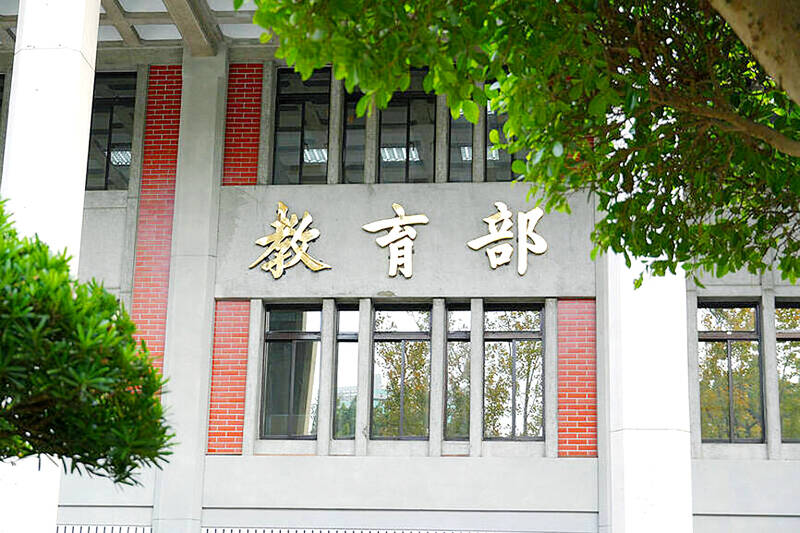Students from several high schools plan to protest outside the Ministry of Education in Taipei today in opposition to the ministry’s draft guidelines on how schools should manage student use of mobile devices on campus.
A student representative said that students are most dissatisfied with the ministry’s “top-down” approach and drafting the policy without involving them in the process.
The ministry should withdraw the guidelines and incorporate public input, including hosting debates and hearings, in drafting a new policy, said the student, who asked to remain anonymous.

Photo: Rachel Lin, Taipei Times
Published on a government-run platform on Wednesday to solicit public feedback, the guidelines are intended to help schools manage students’ use of smartphones, tablets and other mobile devices on campus.
For elementary and junior-high schools, devices brought by students should be held collectively by schools or by each class, the guidelines say.
At high schools, meetings should be convened with teacher, parent and student representatives to discuss rules for a unified management system, they say.
Although the guidelines say that students should be included in discussions, students are concerned that any decisions made through such a process could still be overturned by school affairs meetings, protest organizers said.
There are comments on the online draft that support and criticize the proposed rules. The public can submit feedback on the platform until June 1.
Today’s protest was being organized by two coalitions of student groups and involves several high schools, including Nangang Senior High School and Dazhi High School in Taipei, as well as Banqiao Senior High School and Zhonghe Senior High School in New Taipei City.
Earlier on Thursday, representatives from non-governmental organizations, including EdYouth, held a news conference calling on the ministry to “uphold campus democracy by including students in decisionmaking.”
Several Democratic Progressive Party (DPP) lawmakers attended the event.
At its core, the mobile device management policy is not merely about controlling device use, but the principles of campus democracy, procedural justice and recognizing students as active participants in their education, DPP Legislator Wu Pei-yi (吳沛憶) said.
Involving students in discussions on such issues can lead to greater self-discipline and fewer conflicts, Wu said, urging the ministry to embrace the value of “listening to students.”

A small number of Taiwanese this year lost their citizenship rights after traveling in China and obtaining a one-time Chinese passport to cross the border into Russia, a source said today. The people signed up through Chinese travel agencies for tours of neighboring Russia with companies claiming they could obtain Russian visas and fast-track border clearance, the source said on condition of anonymity. The travelers were actually issued one-time-use Chinese passports, they said. Taiwanese are prohibited from holding a Chinese passport or household registration. If found to have a Chinese ID, they may lose their resident status under Article 9-1

Taiwanese were praised for their composure after a video filmed by Taiwanese tourists capturing the moment a magnitude 7.5 earthquake struck Japan’s Aomori Prefecture went viral on social media. The video shows a hotel room shaking violently amid Monday’s quake, with objects falling to the ground. Two Taiwanese began filming with their mobile phones, while two others held the sides of a TV to prevent it from falling. When the shaking stopped, the pair calmly took down the TV and laid it flat on a tatami mat, the video shows. The video also captured the group talking about the safety of their companions bathing

PROBLEMATIC APP: Citing more than 1,000 fraud cases, the government is taking the app down for a year, but opposition voices are calling it censorship Chinese Nationalist Party (KMT) Chairwoman Cheng Li-wun (鄭麗文) yesterday decried a government plan to suspend access to Chinese social media platform Xiaohongshu (小紅書) for one year as censorship, while the Presidential Office backed the plan. The Ministry of the Interior on Thursday cited security risks and accusations that the Instagram-like app, known as Rednote in English, had figured in more than 1,700 fraud cases since last year. The company, which has about 3 million users in Taiwan, has not yet responded to requests for comment. “Many people online are already asking ‘How to climb over the firewall to access Xiaohongshu,’” Cheng posted on

A classified Pentagon-produced, multiyear assessment — the Overmatch brief — highlighted unreported Chinese capabilities to destroy US military assets and identified US supply chain choke points, painting a disturbing picture of waning US military might, a New York Times editorial published on Monday said. US Secretary of Defense Pete Hegseth’s comments in November last year that “we lose every time” in Pentagon-conducted war games pitting the US against China further highlighted the uncertainty about the US’ capability to intervene in the event of a Chinese invasion of Taiwan. “It shows the Pentagon’s overreliance on expensive, vulnerable weapons as adversaries field cheap, technologically